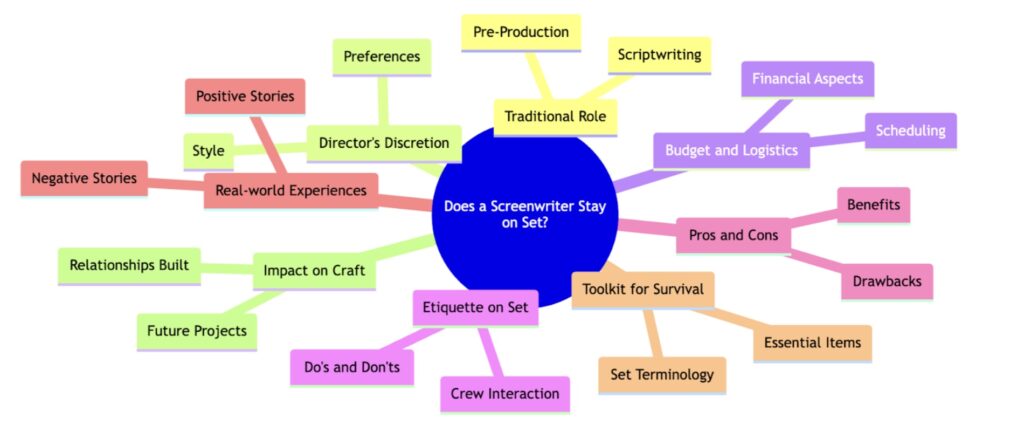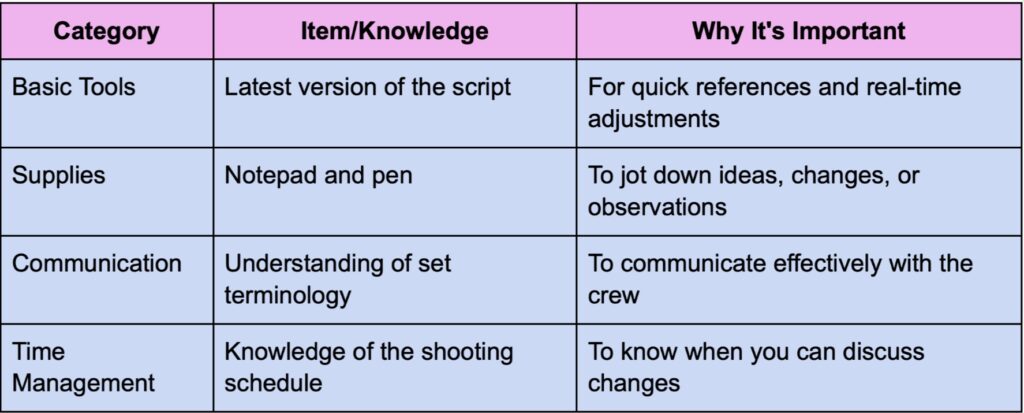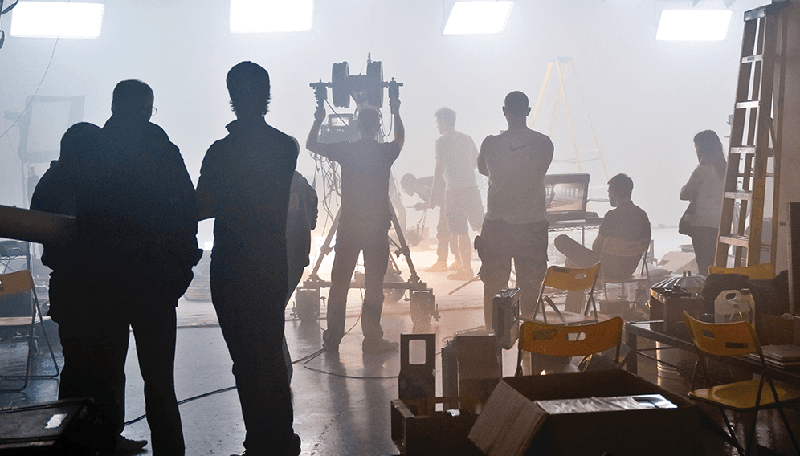Would a screenwriter stay on set during filming? The answer is more complex than you might think.
Multiple factors come into play – from the director’s personal preferences to budget constraints and logistical hurdles.
This article dives deep into these elements, offering a comprehensive guide that will enlighten screenwriters and film enthusiasts alike.
Key Takeaways
- A director’s style significantly influences whether a screenwriter stays on set.
- Budget and logistics often dictate the feasibility of a screenwriter’s presence during filming.
- Proper etiquette on set is crucial for screenwriters to maintain a smooth operation.
- The experience has pros and cons, impacting a screenwriter’s future work and industry relationships.

Screenwriters on set? The Director’s Discretion
The director’s preferences can significantly influence whether a screenwriter is invited on set. Some directors prefer close collaboration with the writer, while others like to have more creative control. Key points to consider:
- Director’s Style: Some directors are more collaborative and appreciate input from the screenwriter.
- Project Type: In indie films, the director might also be the writer, making their presence on set a given.
- Past Experiences: If the director and screenwriter have collaborated successfully, the writer’s likelihood of being on set increases.
Budget and Logistics: The Practical Side
Having a screenwriter on set isn’t just a creative decision; it’s also a financial and logistical one. Factors to consider include:
Travel and Accommodation: If the set is in a different location, who will cover these costs?
Scheduling: Can the screenwriter commit to being on set for an extended period?
Other Budget Considerations for Having a Screenwriter On Set
- Accommodation: Hotel stays or other lodging options.
- Daily Allowance: Food and other day-to-day expenses.
- Time Commitment: Payment for the screenwriter’s time, especially if it extends beyond initial estimates.
- Transportation on Set: Some sets are extensive and require transportation.
Screenwriter Etiquette on Set: The Do’s and Don’ts
Navigating the dynamics of a film set can be a complex task for a screenwriter.
While it’s tempting to hover over the director or actors, it’s crucial to know your boundaries. Understanding set etiquette is not just about knowing where to stand; it’s also about understanding how to contribute without overstepping.
Screenwriters should be aware of the chain of command and should generally communicate their ideas through the director rather than going directly to the crew or actors.
Do’s
- Be Observant: Pay attention to the workflow and dynamics – so you know when it’s appropriate to speak.
- Be Prepared: Always have the latest version of the script and any notes you may need.
Don’ts
- Don’t Interfere: Avoid giving directions to the actors or crew unless you’ve cleared it with the director.
- Don’t Be a Distraction: Keep conversations low-key, and don’t disrupt the shooting process.
The Screenwriter’s Toolkit: Essentials for Surviving On Set
Being prepared is half the battle when it comes to surviving on set as a screenwriter. While the basics, like a copy of the script and a notepad, are a given, there are other less obvious but equally essential items and knowledge that can make your time on set more productive and less stressful.
For instance, understanding set terminology can help you communicate more effectively with the crew. Knowing the schedule inside out can also help you pick the best moments to discuss changes or clarifications.(1)
Table 1: Essential Items and Knowledge for Screenwriters On Set

The Pros and Cons of Being On Set: A Balanced View
Being on set can be an exhilarating and challenging experience for a screenwriter. On the one hand, being present during filming allows you to make real-time adjustments to the script.
This allows for a level of creative control that can be deeply satisfying. However, it can also lead to potential conflicts. Directors and actors may have their own interpretations of the script, and having too many cooks in the kitchen can disrupt the creative process.
Pros
- Real-Time Adjustments: Immediate script changes can be made, enhancing the film’s quality.
- Creative Control: A more hands-on approach to how the script is being translated on screen.
Cons
- Potential for Conflict: Too many opinions can lead to disagreements, affecting the film’s outcome.
- Emotional Toll: The stress of being on set can be exhausting, both mentally and physically.
The Impact on Craft: How Being On Set Influences Future Work
The experience of being on set can have a lasting impact on a screenwriter’s craft. Observing how dialogue is delivered, how scenes are shot, and how actors interpret your words can provide invaluable insights for future projects.
It’s not just about the immediate film at hand; it’s about growing as a writer and understanding the nuances of translating words on a page to actions on a screen.
This experience can also lead to lasting professional relationships. Networking on set can open doors to future collaborations, not just with directors but also with producers, actors, and other crew members.
Real-world Experiences: Stories from the Field
There’s no better way to understand the complexities of being a screenwriter on set than by hearing from those who have lived it.
Some screenwriters describe the experience as incredibly rewarding, offering a unique perspective into how their words transform into visual storytelling. Others caution about the challenges, such as long hours and the emotional toll of creative differences.
These experiences can vary widely depending on the type of production, the relationship with the director, and even the mood on set on any given day. You’re encouraged to research successful screenwriters to find out what they thought about being on set.
The Traditional Role of a Screenwriter in Pre-Production
Before a single frame gets shot, the screenwriter is already hard at work in the pre-production phase.
This stage is the backbone of any film project, setting the groundwork for what will eventually become a full-fledged movie.
Let’s delve into the multifaceted responsibilities that a screenwriter shoulders during this crucial period.
Scriptwriting: The Foundation of the Film
The script serves as the blueprint for the entire film, and crafting it is often a laborious process. Screenwriters create the initial drafts and go through multiple revisions.
They work on character development, plot structure, dialogue, and even specific visual elements that directors might use later. It’s not just about writing a compelling story; it’s about writing a story that can be feasibly turned into a film.
Meetings: Collaboration and Alignment
Once the initial drafts are ready, screenwriters frequently meet with producers, directors, and sometimes even crucial cast members.
These discussions aim to align the script with the overall vision for the film. It’s a collaborative process that may involve script changes to accommodate budget constraints, casting choices, or creative directions that the director wishes to take.
Research: The Quest for Authenticity
Research is an often overlooked but vital aspect of a screenwriter’s pre-production role. Whether it’s a historical drama, a science fiction thriller, or a romantic comedy, every script benefits from a foundation of factual accuracy and real-world details.
Screenwriters may consult experts, visit locations, or dive into extensive reading to make their scripts as authentic as possible.
This research adds depth and credibility to the story, enhancing its appeal to audiences and critics alike.
Table 2: Pre-Production Responsibilities of a Screenwriter

Conclusion
The question of whether a screenwriter should stay on set is multifaceted, influenced by various factors ranging from the director’s discretion to budget and logistics.
While there are pros and cons, the experience can offer invaluable lessons and insights, enriching a screenwriter’s craft and professional network. Therefore, if the opportunity arises, it’s an experience worth considering for any screenwriter looking to deepen their understanding of filmmaking.

